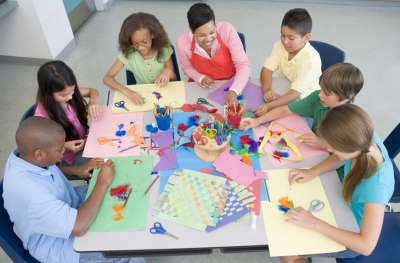Literacy Centers
What Is It?
Literacy centers are an exciting, self-motivational way to enhance, develop, or extend learning within a classroom. At literacy centers, students work alone or interact with one another using instructional materials to explore and expand their learning (Diller, 2003). As students are engaged in meaningful literacy tasks at centers, the teacher is able to provide reading instruction to small groups of students without interruption. Smaller group size provides a greater opportunity for teachers to provide instructional scaffolds and engage the learner (Pressley, 1998). In addition, small-group instruction allows for a more effective type of strategic coaching. Strategic coaching appears to be one of the key elements that distinguish high-achieving classrooms from those with moderate or low performances (Taylor, Pearson, Clark, & Walpole, 1999).
Why Is It Important?
Research shows that to increase students' intrinsic motivation and keep their attention, teachers must provide choices and make learning relevant, personal, and engaging (Jensen, 1998). Literacy centers capitalize on different learning styles, providing opportunities for multisensory learning that combines auditory, visual, and tactile elements into a learning task. Research on multiple intelligences indicates that effective teachers structure activities in a style that engages most or all of the intelligences. These types of activities excite students about learning and provide opportunities for reinforcement of skills and concepts in a variety of ways (Gardner, 1983). Activating multiple intelligences facilitates a deeper understanding of material.
How Can You Make It Happen?
Literacy center activities are opportunities for students to practice and extend the standards they are learning during instructional time-skills and standards that are critical to advancing students' knowledge about literacy. Centers are not used to introduce new skills or for activities unrelated to core instruction, rather, they help students become independent with the literacy skills they have already learned.
Students will be successful, independent learners if literacy center tasks are developmentally appropriate and if clear expectations are set. Effective literacy center tasks are scaffolded for students and provide models of exemplary work. Communicating the expected outcomes of the tasks and developing a system of accountability will increase the accuracy and completeness of student work.
When selecting materials for literacy centers, include familiar materials used previously during large- and small-group instruction. Modeling and guided practice will guarantee students understand the procedures for using the materials.
| Literacy Center Activity | Procedure for Using Materials |
| Students use dry-erase boards and markers to list the words they build at the letter center. | Model how to:
|
Remember, most children need to be taught to be independent. If students are not adhering to classroom guidelines during center time, you need to intervene. First, identify an area of focus based on an observed need, such as how to use a browsing box or tape recorder. Explain and model the procedure for the students. Allow opportunities for shared and guided practice through role playing. Provide corrective feedback during this phase to ensure clarity of expectations. As students return to working at centers independently, regularly monitor their progress (Opitz, 1994).
Grouping Options
- Teacher Working with Small Group
- Letter Center
- Big Book Center
- Writing Center
- Overhead Projector Center
- Listening Center
















